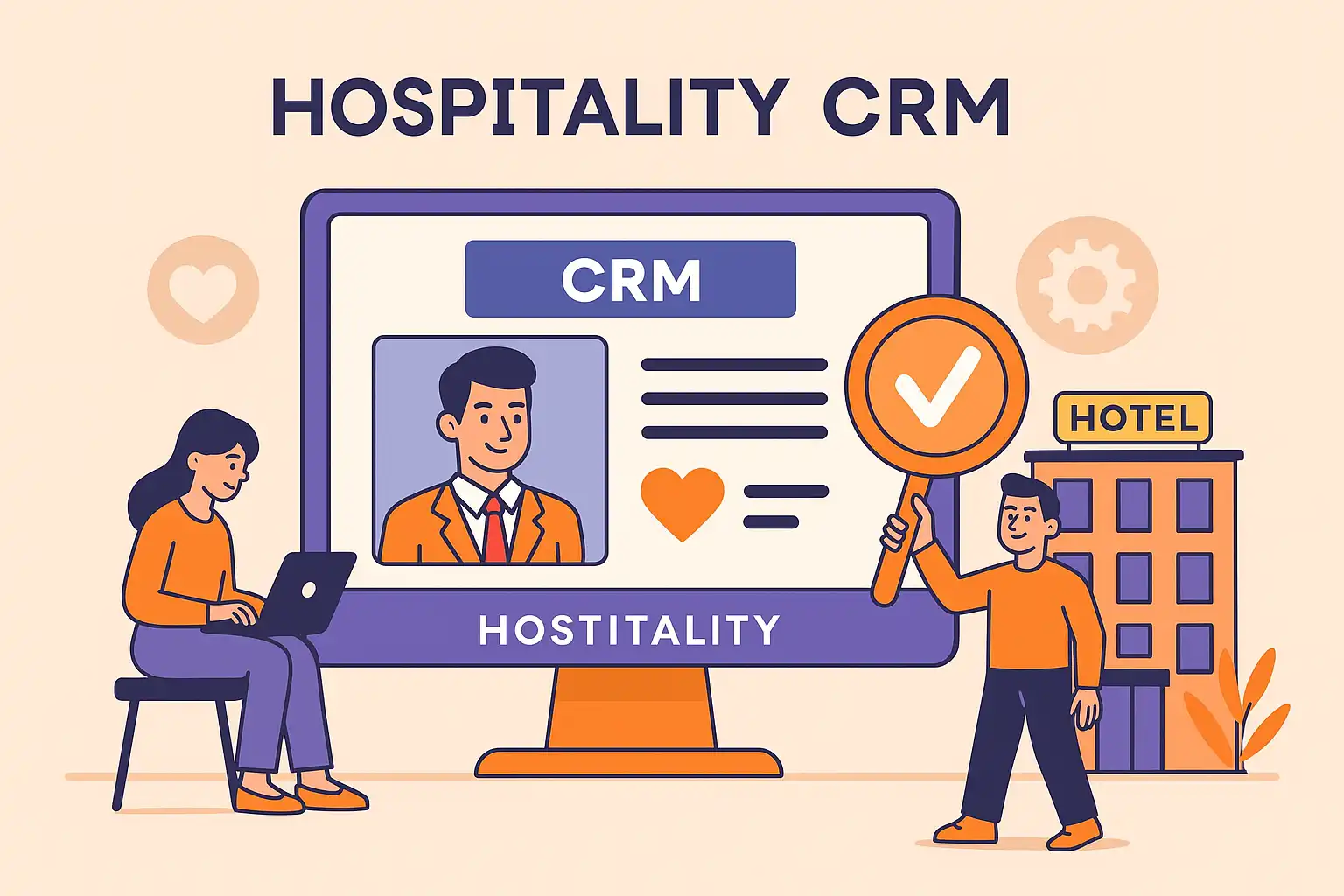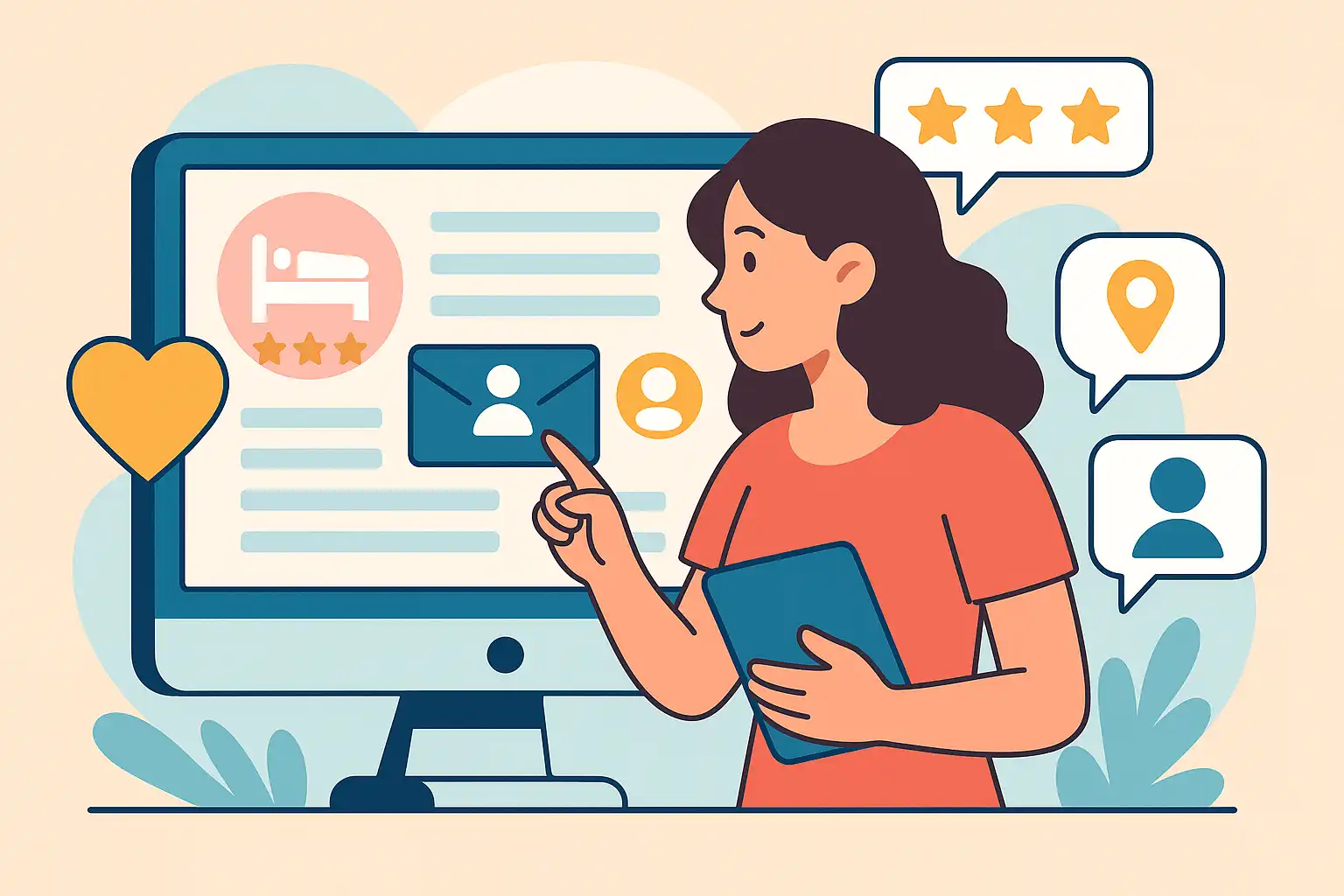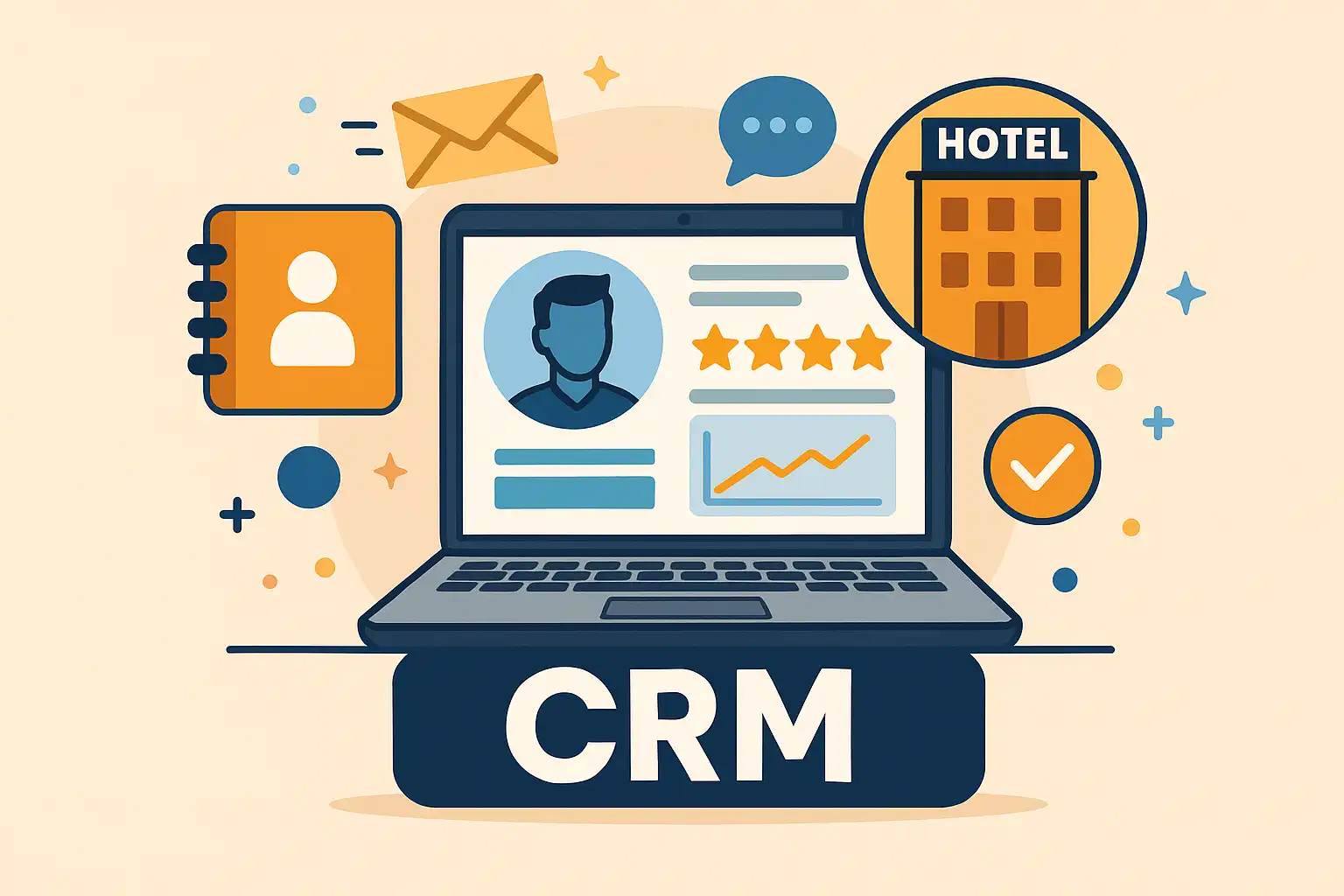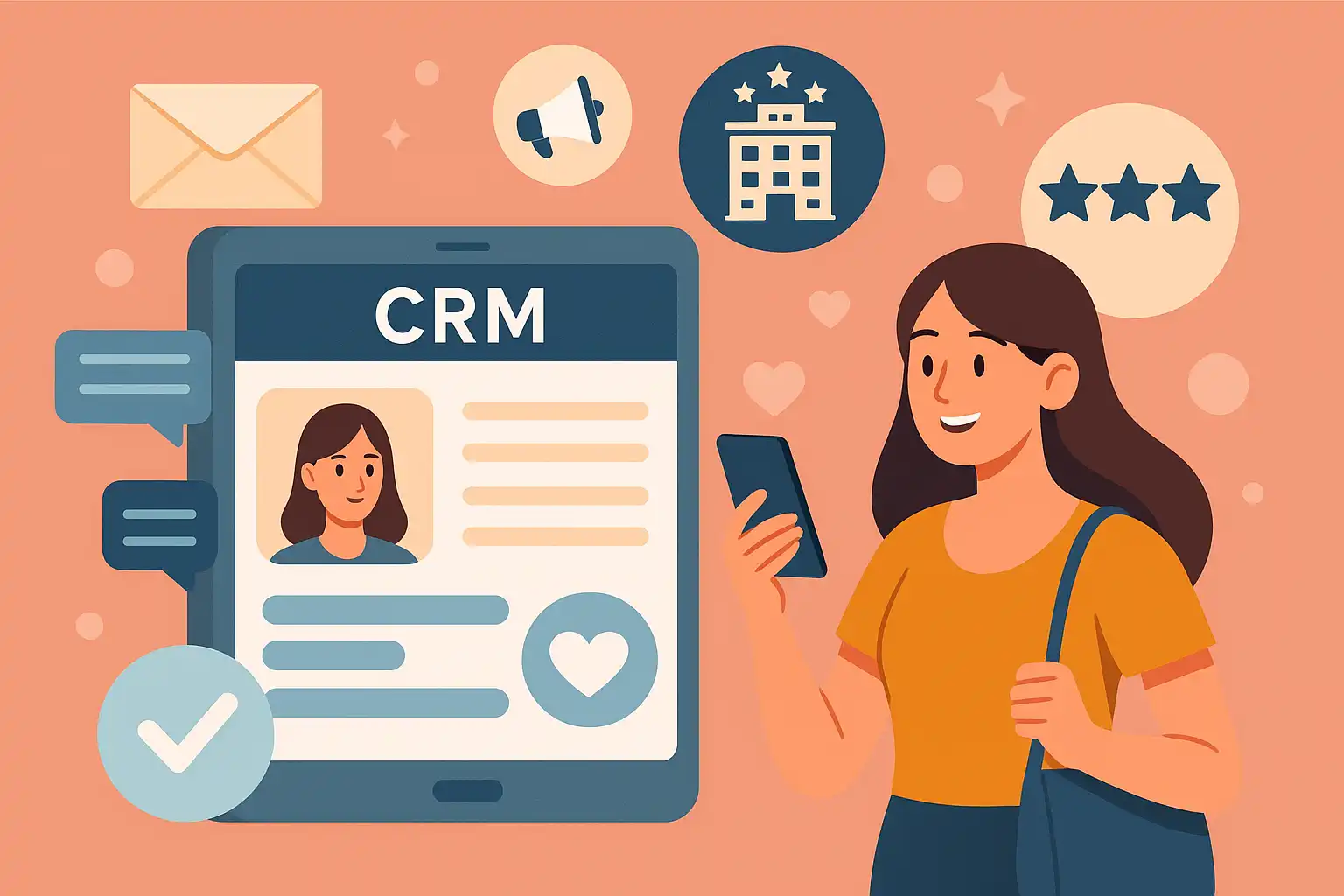Hospitality CRM: Customer Relationship Management for Hotels
 Mika Takahashi
Mika Takahashi Mika Takahashi
Mika TakahashiIn today’s fast-paced and competitive hospitality world, delivering outstanding guest experiences while boosting revenue takes more than just guesswork—it requires smart, data-driven strategies. Guests now expect personalized service that anticipates their every need, and hotel operators are under pressure to make every interaction count. That’s where hospitality CRM steps in as an essential tool for lasting success.
The global hotel CRM market hit $5.2 billion in 2025, highlighting just how important these systems have become in modern hotel management. With 97% of travelers checking reviews before booking, relying on spreadsheets and scattered systems to manage guest relationships simply isn’t enough anymore.
This all-in-one guide will walk you through everything you need to know about hospitality CRM systems—from what they do to how to choose and implement the perfect fit for your property. You’ll see why these specialized customer relationship management systems are revolutionizing hotel operations and learn how to harness their power to elevate your guest experience.

Simply put, a hospitality CRM is a customer relationship management system built just for hotels, resorts, and other hospitality businesses. Unlike generic CRMs that serve all kinds of industries, hospitality CRMs are tailored to handle the unique challenges of managing guest relationships in this sector.
At its heart, a hospitality CRM pulls together guest data from all over—think Property Management Systems (PMS), Point of Sale (POS) systems, booking engines, and even guest feedback platforms. This integration creates a unified guest profile that tracks everything from preferences and stay history to spending habits and communication records.
But it’s not just about collecting data. The system turns this information into actionable insights that help you deliver personalized service and optimize revenue. When a guest checks in, your front desk staff can instantly see their complete history: preferred hotel room type, dietary needs, past complaints, special occasions, and spending patterns. This 360-degree view lets your team anticipate needs and create memorable experiences that build guest satisfaction and loyalty.
Hospitality CRMs also come with industry-specific features like room assignment management, guest journey automation, and seamless integration with hotel technology stacks. They understand key hospitality metrics like average daily rate, revenue per available room, and guest lifetime value.
The biggest difference? While typical business CRMs focus on lead conversion and sales, hospitality CRMs manage the entire guest journey—from first contact to post-stay follow-up—putting a strong emphasis on driving more direct bookings and encouraging repeat visits.
Managing guest relationships manually just doesn’t cut it anymore. Several trends have pushed hospitality CRM systems from a nice-to-have to a must-have for hotels in 2025 and beyond.
The hotel CRM market’s explosive growth to $5.2 billion in 2025, with a projected annual growth rate of 12.8% through 2030, shows how vital these tools have become. Today’s travelers want more than just a place to stay—they want personalized experiences that show the hotel truly values them and understands their preferences.
Data backs this up: hotels using effective CRM systems enjoy 27% higher guest retention and a 23% boost in direct bookings compared to those relying on manual methods. Since 97% of travelers read reviews before booking, maintaining strong guest relationships is critical not just for satisfaction but for protecting your reputation and future revenue.
CRM systems also help increase revenue through targeted upselling, boosting average daily rate by 15-20%. By identifying chances to offer room upgrades, spa packages, dining reservations, or local experiences based on guest preferences and booking history, hotels can maximize each guest’s spend.
With a hospitality CRM, front desk staff can access a guest’s full history the moment they check in, turning a simple transaction into a warm, personalized welcome. Guests don’t have to repeat their preferences from past stays because your team already knows them.
Concierge teams can use CRM insights to anticipate guest needs before they’re even asked. For example, if a guest previously requested Italian restaurant recommendations, the system can prompt staff to have suggestions ready. This kind of thoughtful service boosts guest satisfaction and loyalty.
The CRM supports personalized room assignments and amenity offerings tailored to individual preferences. Business travelers might get a quiet hotel room away from elevators, while families receive connecting rooms near the pool. These small touches make a big difference in creating memorable stays that guests rave about.
Even better, the CRM ensures a smooth guest journey across departments. Information flows effortlessly between reservations, front desk, housekeeping, concierge, and food and beverage teams, so every staff member can deliver informed, personalized service.
Hospitality CRMs automate routine communications like pre-arrival emails, post-stay surveys, and birthday greetings. This keeps guests engaged between stays while freeing your sales and marketing teams from repetitive tasks.
The system also streamlines lead management—from first contact to booking confirmation—so no potential customer slips through the cracks. Automated follow-ups nurture prospects who haven’t booked yet, while personalized offers encourage more direct bookings instead of relying on third-party channels.
The revenue impact is clear: hotels typically see a 25-30% rise in direct bookings thanks to targeted email marketing powered by CRM segmentation. This shift reduces dependence on online travel agencies and their commission fees, improving your bottom line.
Staff productivity also jumps by around 25% as automated task assignments and reminders replace manual tracking. With centralized guest data at their fingertips, your team can deliver faster, more effective service.

The best hospitality CRM systems go beyond basic contact lists. They offer a robust set of features designed to meet the unique needs of hotel operations, helping you centralize guest data, automate marketing campaigns, and optimize revenue—all from one platform.
Integration is key. Your CRM should connect seamlessly with your existing hotel technology stack, including PMS, booking engines, channel managers, and revenue management systems. This ensures your guest information is always accurate and up to date.
At the core of any hospitality CRM is a unified guest profile that pulls data from PMS, booking engines, loyalty programs, and social media. This single platform creates a comprehensive view of each guest, accessible to every staff member interacting with them.
These profiles track detailed guest preferences—hotel room types, pillow choices, dietary restrictions, special occasions—and maintain a full communication history across all departments. This way, guests never have to repeat themselves, and your team always has the latest info.
Real-time updates mean any changes—like reservation modifications or special requests—are instantly visible to housekeeping, front desk, concierge, and more.
Advanced hospitality CRMs come with powerful marketing automation tools that trigger personalized messages based on guest behavior and lifecycle stage. Whether it’s a booking milestone, a stay anniversary, or a birthday, automated campaigns keep guests engaged without extra work.
Segmentation lets you group guests by demographics, booking history, spending habits, and engagement levels. This makes it easy to send targeted offers—business travelers get different promotions than leisure guests, and loyal customers receive exclusive deals.
Multi-channel campaign management coordinates messaging across email, SMS, social media, and direct mail, ensuring a consistent brand experience without overwhelming guests.
Your CRM should also sync with revenue management platforms to align pricing strategies with guest value. Upselling automation suggests relevant add-ons during booking and pre-arrival communications, boosting revenue while enhancing the guest experience.
Cross-selling extends beyond hotel room upgrades to spa treatments, dining, and local experiences. The system identifies guests most likely to purchase these extras based on their booking history and preferences.
Revenue forecasting tools analyze booking patterns and market trends to help you plan strategically and allocate resources effectively.
A top-notch hospitality CRM provides real-time insights into guest satisfaction through surveys and sentiment analysis. This helps you spot issues early and improve service before negative reviews appear.
You’ll also get detailed campaign metrics—open rates, click-throughs, conversions—that let you fine-tune marketing efforts for maximum impact.
Revenue attribution tracking shows how CRM activities translate into bookings and guest lifetime value, helping justify your investment.
Operational reports track staff productivity and response times, highlighting opportunities to boost both guest satisfaction and efficiency.

Picking the right hospitality CRM means balancing your business needs, technical requirements, and growth plans. This choice affects guest experience, operational efficiency, and revenue, so it’s worth taking the time to get it right.
Consider the total cost of ownership, including implementation, training, and ongoing support—not just the software license. Hidden costs can pop up during integration and customization, so budget carefully.
Look for vendors with hospitality experience and a strong track record. Generic CRMs might miss the mark on hotel-specific needs, while specialized providers bring valuable industry insights.
Make sure the system can scale as your business grows, handling more properties, integrations, and evolving guest expectations without needing a complete overhaul.
Check compatibility with your existing PMS, booking engines, and revenue management tools before committing. Integration issues can cause data silos and disrupt operations.
Verify API availability for custom integrations with niche hotel tech platforms. Your CRM should be flexible enough to support your unique setup.
Confirm data migration capabilities to ensure no guest info gets lost moving from legacy systems or spreadsheets.
Real-time synchronization is essential to keep guest data accurate across all systems, especially during busy periods.
Your CRM should let you tailor fields, workflows, and reports to fit your property’s specific needs. No two hotels operate exactly alike, so your system should adapt to you.
Look for pre-built templates for common hospitality scenarios to speed up implementation and ensure best practices.
User interface customization for different staff roles helps everyone get the info they need without clutter.
Mobile access is a must for staff working on the go throughout the property.
Choose a vendor with support staff who understand hospitality operations and guest service challenges. They’ll resolve issues faster and more effectively.
Training programs should cover all departments, ensuring everyone knows how to use the CRM effectively.
Check support response times and availability during your busiest hours.
Plan for a realistic implementation timeline with vendor resources dedicated to your success.

Prostay shines as a top hospitality CRM built by industry pros who get the unique challenges hotels face. It offers a comprehensive, integrated platform that combines CRM, revenue optimization, and operational efficiency tools—all in one place.
This all-in-one approach cuts down on complexity and keeps your guest data consistent across departments.
With over 2,500 properties worldwide trusting Prostay, the platform delivers proven results in guest satisfaction, direct bookings, and revenue growth.
Its hospitality roots mean every feature is designed to solve real-world problems, with intuitive workflows and seamless integration into hotel operations.
Powered by AI, Prostay builds detailed 360-degree guest profiles that go beyond basics. It analyzes booking patterns, spending, communication preferences, and feedback to create rich guest personas.
Predictive analytics spot upsell opportunities and the best times to reach out, helping you send the right message at the right moment.
Sentiment analysis keeps tabs on guest satisfaction across all channels, flagging issues early so you can fix them before they affect reviews.
Automated guest scoring prioritizes your highest-value guests, letting staff focus on those who drive revenue and positive feedback.
Real-time sync with booking engines, channel managers, and revenue management systems keeps data accurate and prevents booking conflicts.
Its open API lets you connect with specialized hospitality tech platforms for maximum flexibility.
Cloud-based architecture ensures 99.9% uptime and automatic updates, so you can focus on guests, not IT.
Hotels using Prostay often see a 35% jump in direct bookings within six months thanks to better segmentation, personalized marketing, and automated follow-ups.
Guest satisfaction scores typically improve by 22%, translating into glowing reviews and repeat visits.
Revenue per available room climbs by 18% through smart upselling and cross-selling based on guest insights.
Staff productivity rises about 25% as automation cuts down on manual work and frees up time for guest interaction.
Getting the most from your CRM means planning carefully and working across departments to hit your goals. Many CRM projects stumble not because of tech but due to poor planning, training, or expectations.
Set clear objectives and measurable success metrics upfront—think guest satisfaction, direct bookings, revenue growth, and efficiency improvements.
Invest in thorough training and change management to ensure everyone adopts the system.
Roll out the CRM in phases to avoid disrupting daily operations.
Audit and clean your guest data before migration to avoid garbage in, garbage out.
Map old data fields carefully to the new CRM structure so nothing important is lost.
Test all integrations thoroughly before going live to prevent surprises.
Establish data governance policies to keep info accurate and compliant with privacy laws.
Create role-specific training for front desk, sales, marketing, and management teams.
Document standard procedures for common CRM tasks and guest interactions.
Identify CRM champions in each department to support peers and encourage use.
Track adoption and provide extra training where needed.
Review CRM analytics regularly to spot improvement areas.
Hold quarterly business reviews with your vendor to keep the system aligned with your needs.
Gather staff feedback to address usability issues and suggest new features.
Benchmark your performance against industry standards to stay competitive.
The future of hospitality belongs to hotels that can deliver personalized experiences at scale while maximizing revenue and operational efficiency. Hospitality CRM systems like Prostay lay the groundwork for this transformation, helping you build stronger guest relationships, increase direct bookings, and grow revenue with smart, data-driven decisions.
Success isn’t just about technology—it’s about putting guests first, fostering teamwork across departments, and continually refining your approach. Hotels that invest in a robust hospitality CRM and follow best practices will stand out in today’s demanding market.
The real question isn’t whether your hotel needs a hospitality CRM—it’s whether you can afford not to have one. As guest expectations rise and competition heats up, the winners will be those who leverage technology to deliver exceptional, personalized experiences that boost guest loyalty and revenue growth.